Irish referendums: Voters reject changes to family and care definition
- Published
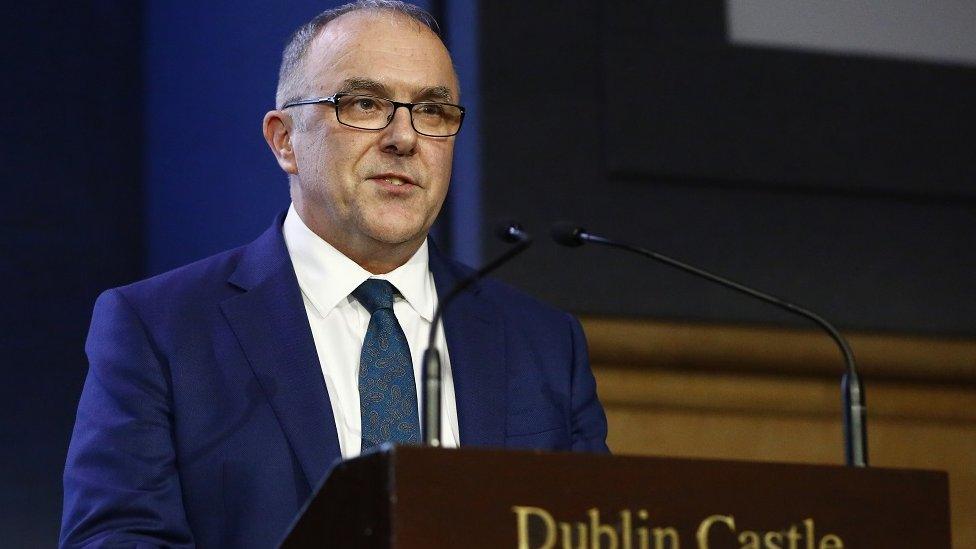
Returning Officer Barry Ryan reads the final result at Dublin castle
Voters in the Republic of Ireland have overwhelmingly voted against amending the Irish Constitution.
Proposals to alter wording in the constitution to include families which are not based on marriage were defeated with 67.7% voting 'no'.
A second proposed change on the wording around the role of women in the home was defeated by a higher margin with 73.9% of voters rejecting it.
It was the highest ever no vote percentage in an Irish referendum.
The first result announced on Saturday evening was in the family referendum.
Leo Varadkar says amendments have been "defeated comprehensively".
The highest 'no' votes came from Donegal where 80% voted no on family and 84% voted no on care.
Only Dún Laoghaire, south-east of Dublin voted narrowly in favour of changing the definition of a family.
After a long wait, Waterford was the final constituency to declare its result for the care referendum.
In the care referendum, on the role of women in the home, 1,114,620 people voted no, compared with 393,053 yes voters, or 26.07% of the total.
There was a turnout of 44.4% in the referendums, which were held on Friday.
This compares to a turnout of 64.1% for a referendum on abortion laws in 2018.
'Defeated comprehensively'
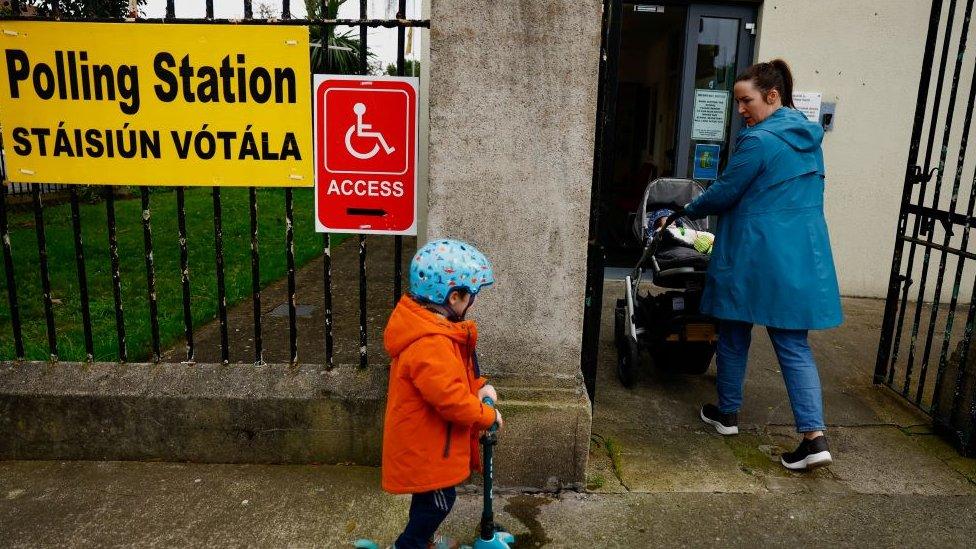
Results from Friday's referendum are coming in
Earlier, Taoiseach (Irish Prime Minister) Leo Varadkar said "it was clear" that two referendums have been defeated.
Mr Varadkar said it was clear both amendments had been "defeated comprehensively on a respectable turnout".
He said the Irish government accepted the result and will "respect it fully."
"As head of government and on behalf of the government, we accept responsibility for the result," he said.
"It was our responsibility to convince the majority of people to vote 'Yes' and we clearly failed to do so."
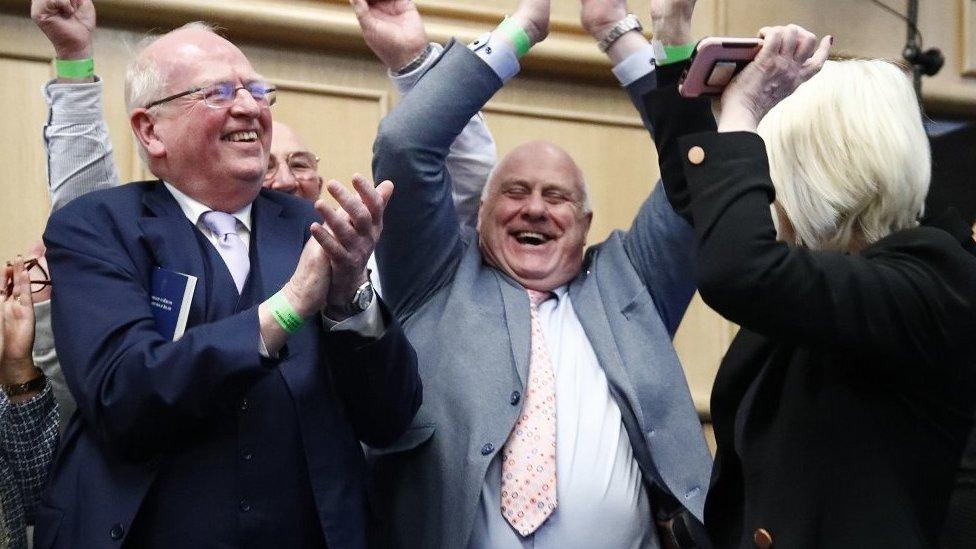
Senator Michael McDowell (left) with No campaigners
Meanwhile, tánaiste (Irish deputy prime minister) Micheál Martin said he fully accepted the decision of the Irish people.
"On this occasion, the majority clearly were not persuaded as to the merits of the two proposals put forward," he said.

A clear result from the start- Darran Marshall, BBC News NI - in Dublin
The courtyard at Dublin Castle has witnessed many historic moments.
Over recent years it was where crowds gathered to celebrate momentous changes to the country's constitution - including referenda on same sex marriage and abortion reform.
There were no such scenes today. No big crowds. No celebrations. With the exception of a handful of Aontú supporters the courtyard was desolate.
Within minutes of the ballot boxes opening this morning it was clear the electorate had rejected both proposals to change the constitution.
The only question would be, what would be the margin of defeat for the government and the main opposition parties?
The Taoiseach was here for a short time and spoke to the media in a room inside Dublin Castle.
The Sinn Féin leader Mary Lou McDonald also spoke to waiting media but her comments were interrupted by a few hecklers.

Earlier on Saturday Green Party Leader Eamon Ryan who campaigned for 'yes' said the result would be respected.
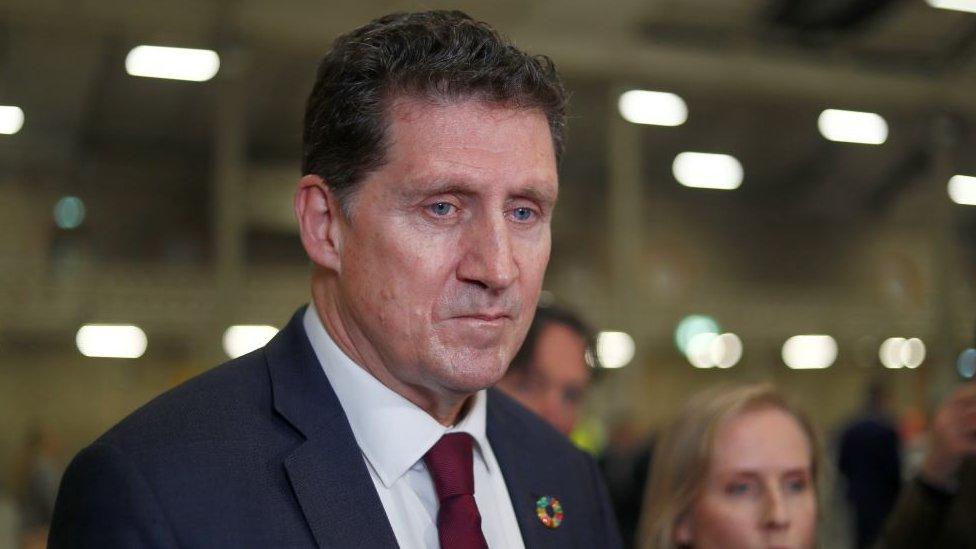
Green Party Leader Eamon Ryan says the result will have to be respected
Mr Ryan said: "It's the voice of the people and in our constitution, it's the people who are sovereign.
"It's they who decide what goes into our constitution."
Mr Ryan, who was at the RDS count centre in Dublin said: "If it is a no vote in both, we will have to respect that."
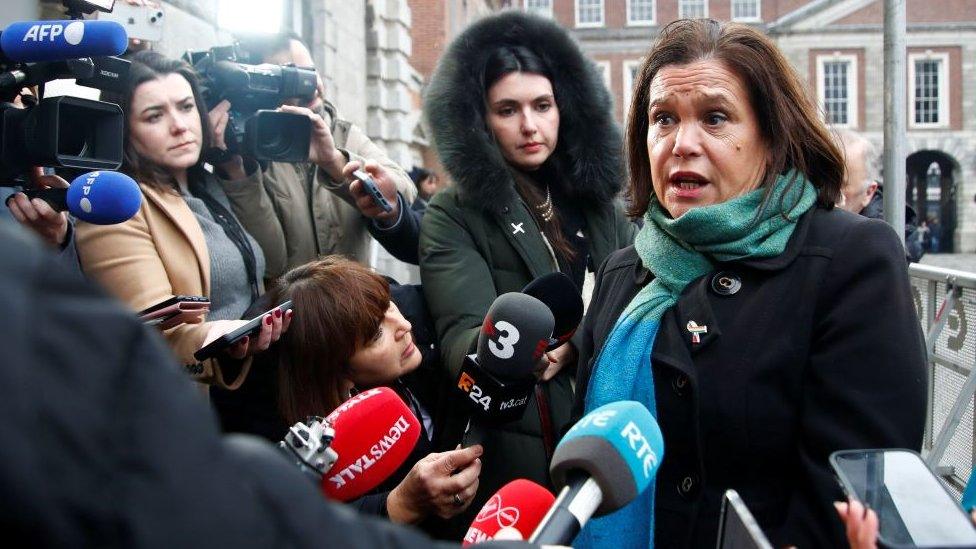
Mary Lou McDonald says that her party is still "very much" in touch with the public
Sinn Féin leader Mary Lou McDonald was jeered by a small crowd and called "a traitor to the Irish people" as she arrived at Dublin Castle.
Her party advocated for a "yes-yes" vote but she said the government had "come up short in terms of the caring wording" and there had been a "lack of clarity".
Ms McDonald said the people of Ireland had spoken "very, very definitively" but insisted her party were still "very much" in touch with the public.
"They disregarded the citizens assembly, they didn't consult with opposition or with other stakeholders. They didn't collaborate, and they failed to convince," she said.
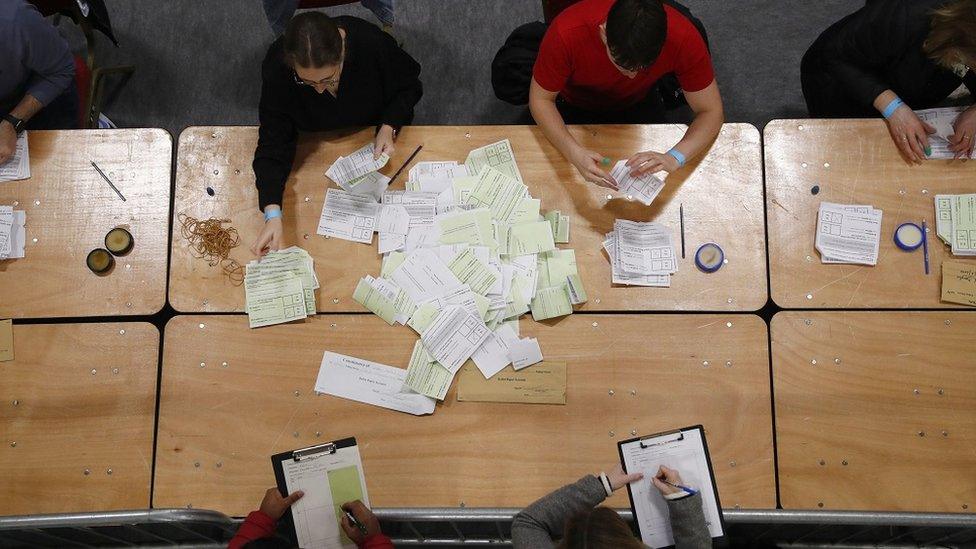
Ballots are continuing to be counted in twin Irish referendums
Government misjudged mood of electorate - McDowell
Senator Michael McDowell, who opposed changes to the Irish constitution, said the results suggested a "no-no substantial margin right across the country".
Mr McDowell a previous tánaiste (deputy prime minister) and justice minister said: "It seems like the government misjudged the mood of the electorate and put before them proposals which they didn't explain, proposals which could have serious consequences."
'Virtue signalling' - Tóibín
Aontú Leader Peadar Tóibín who also backed the 'no' campaign, described the amendments as government "virtue signalling" with vague language.
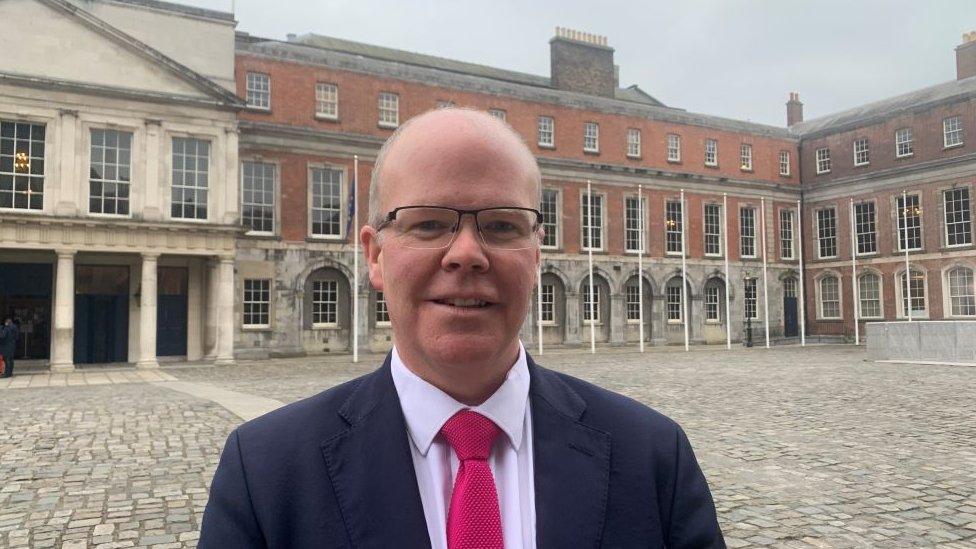
Peadar Tóibín describes the amendments proposed as "virtue signalling"
He added: "The Sinn Féin leadership look marooned from their former support base, from their voters and that's a very dangerous place for Mary Lou and the Sinn Féin leadership to be."
Watershed moment for disabled citizens - Clonan
Senator Tom Clonan described the wording in the care referendum as "toxic" to the fundamental human rights of disabled citizens.
Mr Clonan, who has a 22-year-old disabled son, said he hoped there would now be a conversation about "ableism".
He said a 'yes' vote would have brought Ireland into international disrepute.
"The state has been abject in its treatment of disabled citizens. We now have an opportunity to debate that going forward, and find ways to really bring ourselves in line with the rest of Europe and how we vindicate the rights of disabled citizens.
"I'm hoping that this is a watershed moment for disabled citizens."
What were voters asked about family?
Those taking part in Friday's referendum were presented with two ballots - one white and one green - and were asked to vote yes (Tá) or no (Níl).
The white ballot asked if voters accepted or rejected the Thirty-Ninth Amendment of the Constitution Bill - otherwise known as the Family amendment, external.
The Irish constitution currently offers legal protections to the family unit, but ties the concept of family to the institution of marriage.
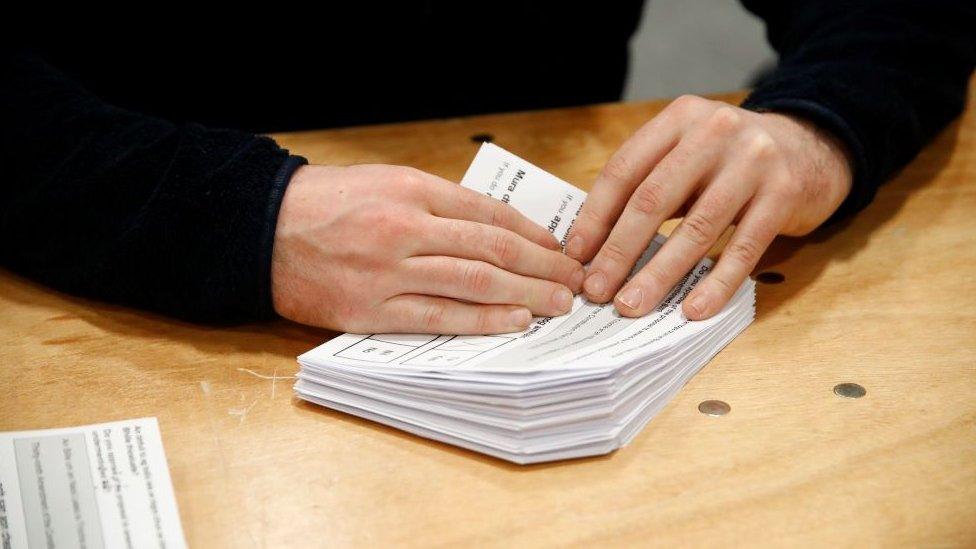
The amendment sought to expand the constitutional definition of family to include other "durable relationships"
The amendment sought to expand the constitutional definition of family to include other "durable relationships" such as unmarried couples and single parent families.
What is the Care amendment?
The green ballot asked voters to accept or reject the Fortieth Amendment of the Constitution Bill - or the Care amendment, external.
Currently the Irish constitution - or Bunreacht na hÉireann - says mothers should not have to go out into the workplace to the neglect of their "duties in the home".
It also states that women's "life within the home" is a source of support to the state which is necessary for the "common good".
The amendment asked for both of these articles to be deleted and a new text to be added saying the state "shall strive to support" the provision of family-based care.
Related topics
- Published8 March 2024
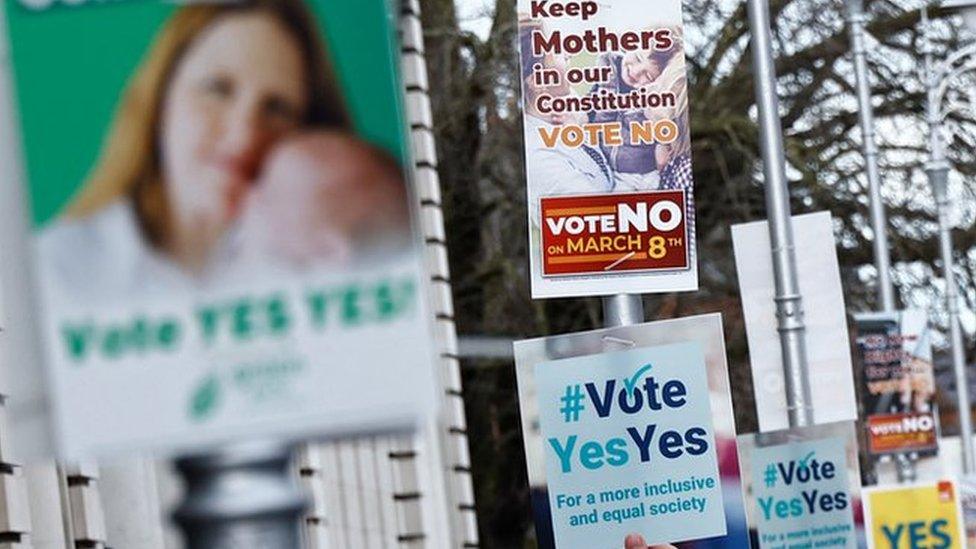
- Published7 March 2024
